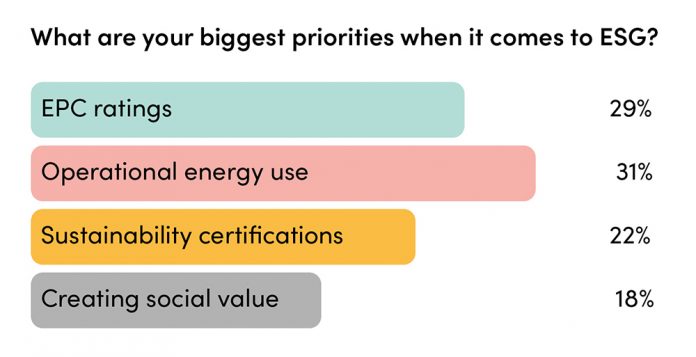ESG (Environmental, Social, Governance) is the buzz word of the industry, but for good reason. With the pressing need to counteract the effects of climate change, the Government, and businesses alike, are all looking for ways they can decarbonise real estate and become a net zero industry.
With ESG covering an extensive variety of topics, it can be difficult to understand where priorities should lie in creating a business focused on ESG. From renewables to affordable housing, how do we decide what is more important? And who is most appropriate to make that decision?
Real estate has its say
In a study conducted by international real estate consultancy Hollis, participants from the built environment were asked via a LinkedIn poll to select their main priority out of the following ESG focused options: increasing EPC ratings, improving operational energy use, achieving sustainability certifications and creating social value. Results showed that operational energy use was the highest priority gaining 31% of the votes, EPC ratings gathered 29% of votes, sustainability certifications at 22% and creating social value came in at 18%.
Voted as the highest priority, improving operational energy use in buildings falls in line with UK net zero goals and the target of decarbonising real estate. Put simply, operational energy is the energy required to run a building, i.e the energy used for heating and power. From LED lighting, to air source heat pumps, to renewable technology, there are an array of methods to reduce energy use and increase efficiency.
With energy efficiency leading the way on ESG priorities, it is no surprise that improving EPC ratings falls closely behind. An EPC (energy performance certificate) is a legislative requirement used to measure and compare the energy performance of buildings, taking into consideration building use, insulation, efficiency and what fuel types are used for energy supply. To help reach net zero targets, the UK Government are proposing to raise the minimum energy efficiency standards (MEES) meaning owners now need their assets to hold a minimum of EPC rating B by 2030. With a large proportion of buildings requiring refurbishment to stay MEES compliant, it is no surprise that EPC ratings are the second highest ESG priority for the industry.
There is no one way to determine whether a building is ESG compliant and EPC rating is not the only achievement on owners’ minds. Over a fifth of survey participants deem it more important that a building holds a sustainability certification, for example BREEAM, LEED, WELL or Fitwel as its desirability increases for potential tenants.
Social value falls at the bottom of the priority list from participants. Social value can be defined as the positive value businesses create for communities and society, so in the case of real estate, this could be creating opportunities for equity, or delivering affordable housing developments. Whilst environmental factors are understandably, and crucially, a focus for many, we should not overlook the importance of social factors. Buildings should be designed for the benefit of everyone in communities, and opportunities should be created to support a diverse and inclusive environment. With social value dramatically increasing in importance, it will be interesting to see whether this soon gains equal priority to environmental considerations.
Hollis has its say
A pecking order may have been determined in this study, but with no real majority winner the results highlight that ESG priorities differ for everyone. It is for this reason, a strategy that incorporates different elements of ESG is necessary to achieving your goals. There is no one size fits all method to becoming ESG-compliant but there are a variety of measures you can put in place to ensure your decision-making benefits both people and planet, as well as profit.
Hollis has the expertise to support clients on all aspects of developing their ESG strategy, from inception through to implementation. Working with developers, funders and asset managers, Hollis combine their ESG expertise with advice from specialist teams in areas such as project management, cost management and mechanical and electrical engineering to produce low carbon, energy efficient and socially equitable real estate ensuring that emphasis is placed on the entirety of ‘ESG’, and not just the ‘E’.
Get in touch with Director and Head of ESG Consulting Katherine Beisler or Director and Head of Environmental Consultancy, Vikki Aitkenhead based in Glasgow to find out more.
Contact details:
Katherine Beisler – Director and Head of ESG Consulting
+31 629 218 350
katherine.beisler@hollisglobal.com
Vikki Aitkenhead – Director and Head of Environmental Consultancy
+44 7500 067739
vikki.aitkenhead@hollisglobal.com






